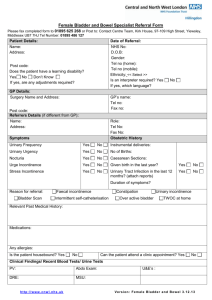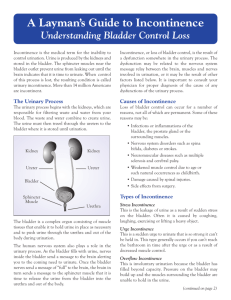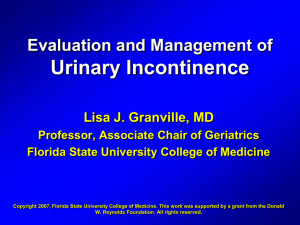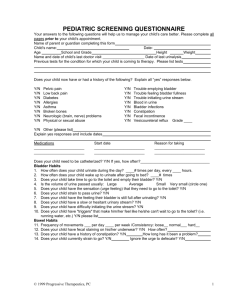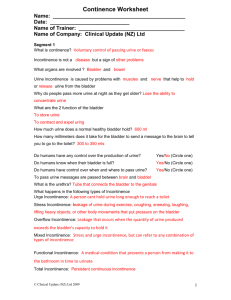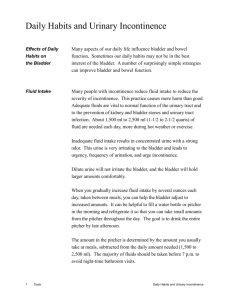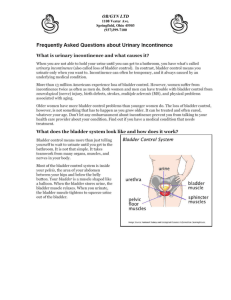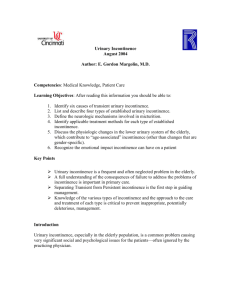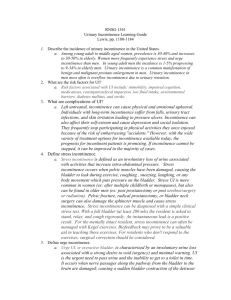Urinary Incontinence Help Booklet
advertisement
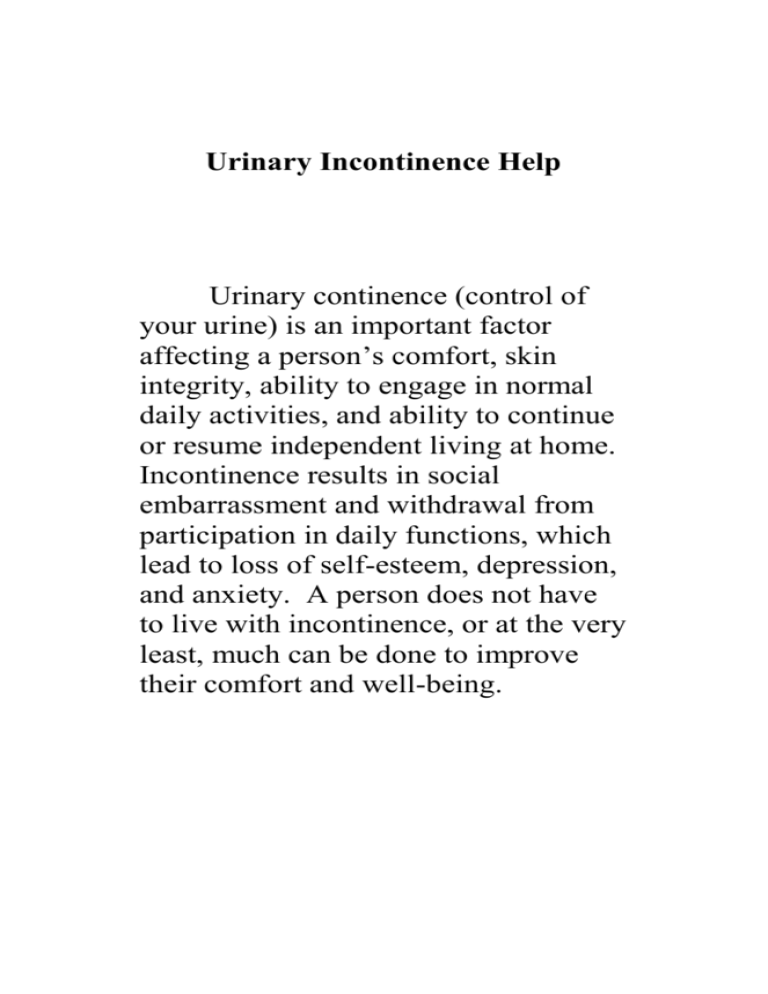
Urinary Incontinence Help Urinary continence (control of your urine) is an important factor affecting a person’s comfort, skin integrity, ability to engage in normal daily activities, and ability to continue or resume independent living at home. Incontinence results in social embarrassment and withdrawal from participation in daily functions, which lead to loss of self-esteem, depression, and anxiety. A person does not have to live with incontinence, or at the very least, much can be done to improve their comfort and well-being. Types of Incontinence: o Stress – urine loss caused by an over distended bladder. o Urge – the involuntary loss of urine associated with a strong desire to urinate. o Functional – urine loss caused by factors outside the lower urinary tract such as chronic impairment of physical or mental functioning. o Overflow – loss of urine associated with over distension of the bladder. May be caused by under-active muscle contraction or obstruction. Management of Urinary Incontinence: o Timed Voiding - person will pass urine at set times. Recommended for a person who is able to learn to recognize some bladder fullness or the need to urinate, or is able to ask for assistance. Also useful for a person with an impaired bladder sensation, who may benefit from being instructed to pass urine by the clock. o Bladder Training – for a person aimed at achieving a more normal urination pattern. Urination should occur every 3-4 hours without incontinence. Person records a bladder chart and an individual regime is planned with gradual increase in the time intervals. The person is asked to defer urinating using specific techniques. o Pelvic Floor (Kegel) Exercises o If you take Diuretics (water pills), be sure you time them for early in the day to avoid night time urination. o Eliminate Bladder Irritants: Some foods can contribute to bladder leakage, such as alcohol, sweetener substitutes, spicy foods, tomato-based products, caffeine, citrus, carbonated beverages, and chocolate. o Fluids are very important for proper body functions. Drink a glass of fluid every 2 hours until 2 hours before bedtime. o Urinate upon arising. o Cleanse after incontinence to avoid developing a urinary tract infection, control odor, and prevent skin breakdown. o Ask your physician about bladder medication. o Urinate on a schedule to train your bladder. o Avoid constipation as this will increase the pressure in your abdomen. o Maintain optimum weight to decrease internal pressure. o Stop smoking, this will increase muscle control, as well as overall general health improvement. o Use protective pads that match the amount of incontinence. o Ask your physician about a referral to the SPH Continence Clinic at 4442340 “SPECIAL BRAN RECIPE” Mix together: 1 cup applesauce 1 cup coarse unprocessed wheat bran ¾ cup prune juice Refrigerate in a covered container between uses. Take 2 tablespoons of the mixture every day with a glass of water. Take the mixture in the evening for a morning bowel movement. Increase the bran mixture by 2 tablespoons each week until your bowel movements are regular. Always drink a large glass of water with the mixture. Your goal should be to achieve one soft, wellformed bowel movement daily. A normal reaction to bran is stomach bloating and increased gas. These usually subside within a few weeks. AGENT Alpha Blocking Agents Phenoxybenzamine Prazosin Labetolol Antihypertensive Methyldopa (Aldomet) Bladder Relaxants Anticholinergic Agents Tricyclic antidepressants Bladder Stimulants Cholinergic agents Caffeine Sedatives Antihistamines Antidepressants Antipsychotic agents Tranquilizers Miscellaneous Alcohol Loop diuretics Lithium Non steroidal anti inflammatory Surgam (NSAID) Cyclophosphamide ACTION Decreases smooth muscle tone Smooth muscle relaxant, therefore risk of incomplete emptying Enhance detrusor excitability Cloud consciousness less aware of bladder sensation. Can also cause incomplete emptying TYPE OF INCONTINENCE Stress Incontinence Overflow incontinence Anticholinergic agents can cause urinary retention and impaction Urge incontinence Urge incontinence Sedative and diuretic Increase urine production and frequency polydipsia Urge incontinence chemical cystitis Urge incontinence
